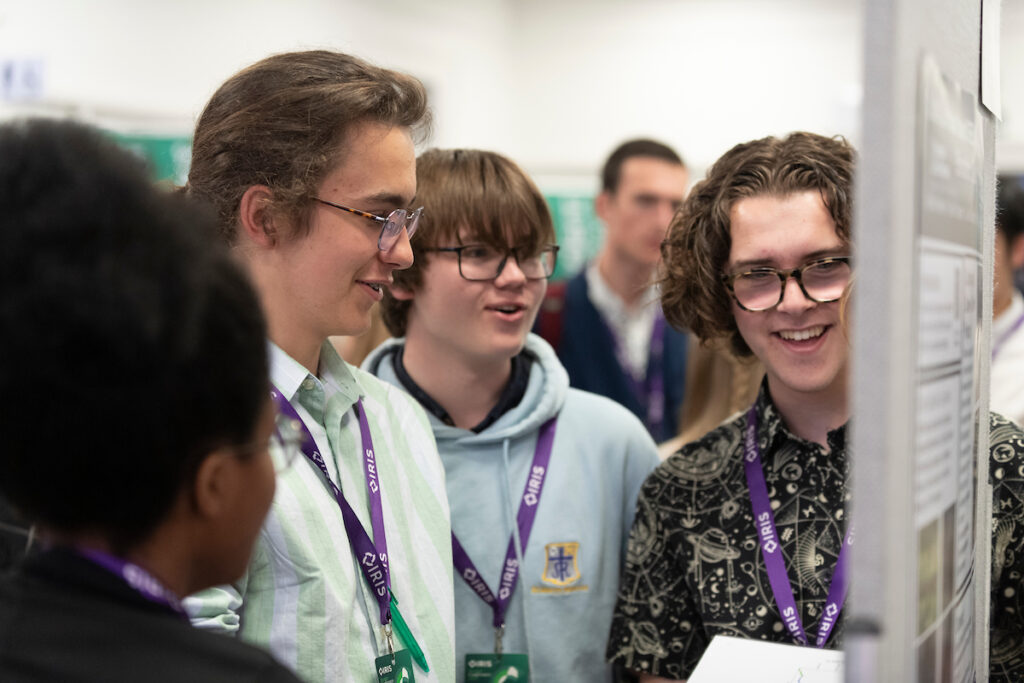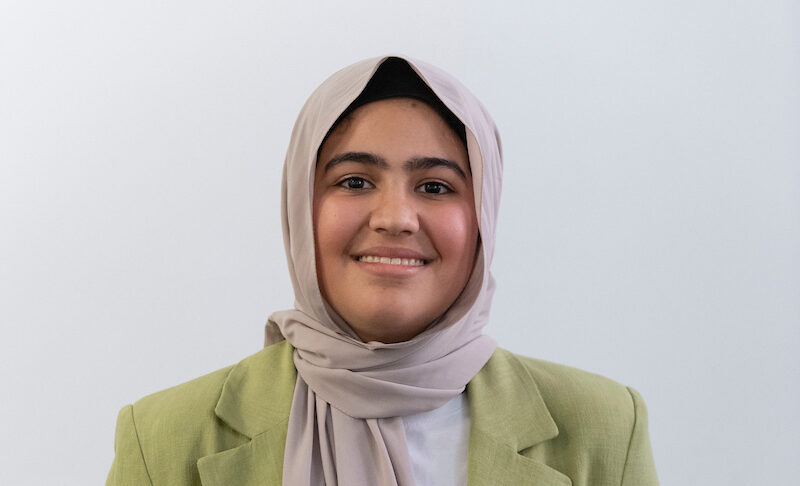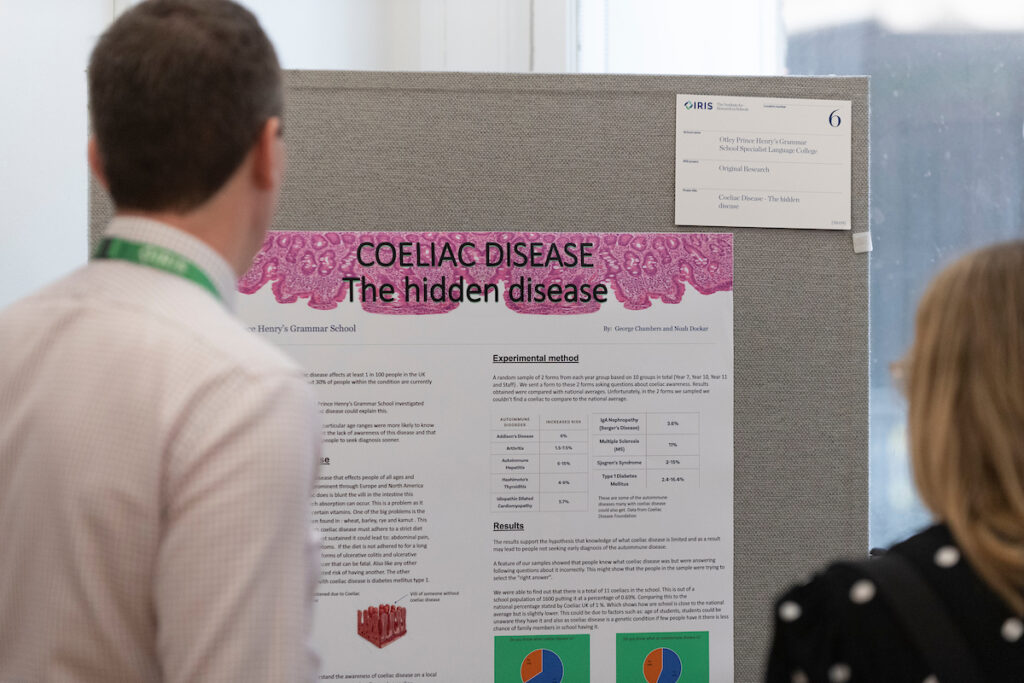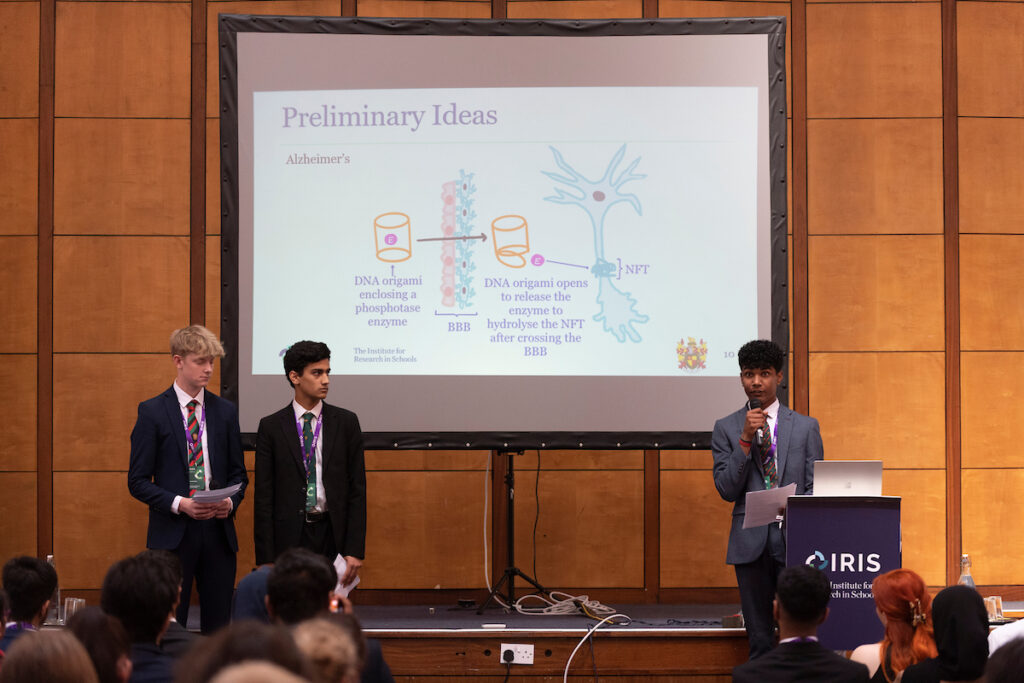
IRIS Conference, Manchester:
robot dentists, Coeliac disease awareness and more
22 June 2023 – Young researchers from across the North West travelled to Manchester to share their discoveries with members of the scientific community and their peers.
The IRIS student conferences, which took place at Exeter, Manchester and London this year, offer opportunities for IRIS students to share their research and meet with their peers and members of the wider scientific community. The experience builds communication skills, fosters collaboration and strengthens self-confidence.
The Manchester event was no exception, with passionate young researchers confidently presenting their findings on stage. Some of the topics covered included research into the application of DNA Origami in medicine, the analysis of Spectra collected by the Spitzer Telescope, identifying therapeutic targets for Motor Neurone Disease and looking at the cross-curricular use of SEM at school.
 Students looking at research posters at the Manchester conference
Students looking at research posters at the Manchester conferenceSimone Blaize, a teacher from Altrincham Grammar School for Boys said: “I didn’t know what to expect with a student conference, but it’s very organised and the calibre of research is impressive. It feels like an academic conference. It’s a real stepping stone for them for them to see what university might be like. At the same time it’s comfortable, students are enjoying themselves – I see them smiling.”
Selma, a final year student from Liverpool Life Sciences UTC, combined her interest in dentistry with the knowledge she gained from taking part in IRIS’ DNA Origami project to embark on research into nano-dentistry. Selma’s research found that creating a nano-dentist robot that can regenerate enamel and mineralise teeth could potentially improve dental health in the UK.
Through this experience, I was able to learn
what I want to do in the future.
At the event, we spoke with Selma who said: “I learned a lot thanks to doing my project – I improved my communications skills and I had the chance to share my work with a wide range of people. It also allowed me to improve my project as I talked to academics and scientists. Through this experience, I was able to learn what I want to do in the future.
Thanks to this experience, I’m interested in studying DNA nanotechnology. Before the project, I wanted to be a dentist because it’s a stable job – now I want to be doing research.”
Selma’s research was very impressive and hinted at a future where young scientists will forge pathways towards innovations which will improve our lives in creative and sophisticated ways. Take a look at Selma’s poster here.
 Selma, a student from Liverpool Life Sciences UTC who completed research into nano-dentistry
Selma, a student from Liverpool Life Sciences UTC who completed research into nano-dentistryStudents from Prince Henry Grammar, George and Noah, undertook an Original Research project into how familiar the general population is with Coeliac disease. The research was significant to the pair because George himself is coeliac. With their research poster, they intended to spread awareness of the disease and encourage others to seek a diagnosis as early as possible. Without treatment the disease can often progress into life-threatening autoimmune conditions.
Speaking about his experience with the research project, George told us: “It’s completely changed my understanding of coeliac disease. I went into the research almost knowing nothing about my condition. Now, I know so much more and realise there’s even more to learn.
“The curriculum is confining, with a list of methods to learn for chemistry, but with research, we’ve been able to plot our own way from one topic to another. Some of the projects students have been doing across a wide range of sciences are amazing, it blows my mind. From raising awareness of a disease to the depths of theoretical physics.”
 Conference attendees looking at George & Noah’s research poster
Conference attendees looking at George & Noah’s research posterYuvan, Ibrahim and Freddie from Altrincham Grammar School for Boys presented were the first student presenters of the day. Their research focused on the medical applications of using DNA Origami in targeted drug delivery designed to prevent organ transplant rejection. The group presented confidently and their research was very advanced.
Since taking part in the research and presenting their findings at the conference and at the Bragg Centre for Materials Research, all three have expressed interest in pursuing research as a career.
I didn’t know what to expect from a student conference, but it’s very organised and the calibre of research is impressive. It feels like an academic conference, but at the same time it’s comfortable, students are enjoying themselves – I see them smiling.
Yuvan told us: “We don’t get the opportunity to do research in the school curriculum, so having the chance to do that through this project – it’s sparked a greater passion for research.”
Ibrahim said: “It has expanded our knowledge outside the curriculum and allowed us to work as a team. We enjoyed delving into the research and I’m know considering doing a PhD now that I’ve had a taste of research.”
And Freddie said: “It’s made me question what I want to do later in life, whether I might want to go fully into research to experience a life of coming up with new things that could revolutionise medicine.”
 Freddie, Ibrahim & Yuvan presenting their research at the conference
Freddie, Ibrahim & Yuvan presenting their research at the conferenceThe Manchester conference was an incredible event, with students passionately exchanging ideas and mingling with members of the science fields. The calibre of research presented on stage and in the research posters was incredible and we cannot wait to see where each of these students go next and what they choose to dedicate their passion and curiosity to.
We are so proud of the innovation shown by all the students, and also so grateful to their teachers who made it possible – without their support and commitment, none of this would be possible.
Are you interested in signing up for a project? Take a look at what you could get involved in on our project page. Want to find out more about attending next year’s conference? Head over to our conference page.